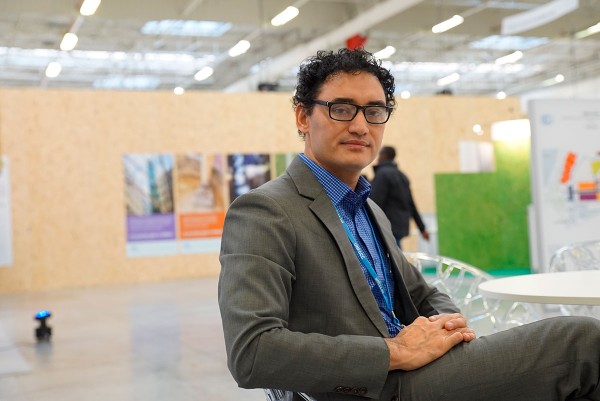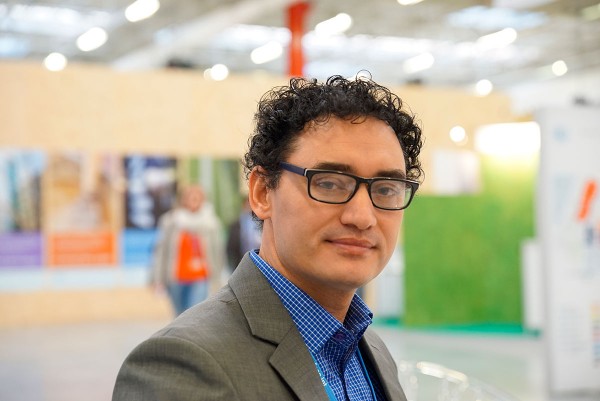“Everybody is holding on till the very end, which is very sad.”
 As both, part of the Nepal delegation at COP21 and the LDC group (the Last Developed Countries) Raju Pandit Chhetri is in the centre of the negotiations in Paris. Thomas Venker catched him between two drafts of what is hoped to become the climate agreement.
As both, part of the Nepal delegation at COP21 and the LDC group (the Last Developed Countries) Raju Pandit Chhetri is in the centre of the negotiations in Paris. Thomas Venker catched him between two drafts of what is hoped to become the climate agreement.
Raju, you must be really busy right now. Thanks for taking your time here.
There is not so much going on right now, apart from the presidency counsulting with various negotiating groups. Everybody stopped talking, because the next draft of the agreement text is coming out in the evening.
How transparent does this process leading to a new text version feel for you. I ask because yesterday it felt for me as an observing journalist as if the French presidency was super selfconfident on their draft – and then most of the speakers replying on it where quite negative in their respond.
You have to see this from a very political perspective. The parties appreciate what the French are doing, but they also tell them to be careful. It is a constant political reminder not to expect the presidency not doing something else in the last two days as in the past COPs. But you should keep in mind, sometimes those negative words are not what they are really saying, it is more a message to the presidency to be convenient and stay on the right track.
So for you the reaction was not so bad?
No. We have seen this process all the time in the past, not just here. It is a constant reminder to the presidency that they keep acting in a transparent manner and at the same time that there are certain concerns that have to be reflected and could not be avoided. The French have to take those things in their hands.
When the new draft came out yesterday, I was hanging in between some NGO people and studied them arguing and interpretating the draft quite long and intense and with different interpretations of certain aspects. Coming from that: do you delegates understand all those points in the same way?
The thing is: this is a party driven process. Every party has the equal right to make their points, to agree and disagree. Yesterdays text was a text from which everybody knew that this will not be the final version. Still the presidency took two days to consolidate with various parties and groups to came up with this text.
So when the groups started reacting to it, everybody felt encouraged to say something on the basis of it to built up a new agreement from that stage on. It was a trigger mechanism everybody needed to respond with something on the basis of the national interest. But it is not said, that what they say on the plenary is the same thing they say in the negotiating rooms – there will be lot of compromisses. Not everybody could get what he wants.
So the reaction in the plenary was mostly for the people in the homecountry?
Exactly.
 That said, what could we expect from the new draft?
That said, what could we expect from the new draft?
There is the possibility that several new drafts will come in between before the final draft is on the table. Like four or five new drafts, one every few hours. Yesterdays draft was there to set the tone: this is how it is going forward. We still have lots of differencies. We have agreed on some matters, but there are still very controversial and political issues that needs to be tackled… and there is a deadline. So how do we react on that? All this is a political process. But I would say: we are on a good way.
You – not only as part of the Nepal delegation but also part of the LDC group, the Least Developed Countries – are an important part of the discussion(s) happening between the drafts. How easy is it for you to get all the different reactions of your group members balanced in this process?
The thing is: everybody understands, you don´t get all that you want. Within the group all the countries have their own positions, so as soon as the text comes out each group analyses – to come to an understanding if the minimum of what they want is registered there.
Is everything they wanna achive still in? Or is it taken out? If they miss certain strong points, they bring it up as they are not willing to compromise at this stage of the negotiations – as they wanna keep on seeing how this moves before maybe doing so. There will be trade-offs later on. But it is not just about what is not in, they also mention the important key points and send a “thank you” for keeping this in.
How much of the game to come do you have in your mind? Are you replaying parts of it in different set ups all the time, like a chess player?
That does happen to some extent, as you have some things to give and some to take – but lots of the major parties, especially the US, the EU, the G77 and China, I don´t think they have so much flexibilty at this stage.
Mentioning the US and EU, how much do you feel on eye level with them? I know, everybody got the same vote, but we also know…
I hear what you say. That´s why the LDC countries for example, who would not be able to act on their own, come as a group. That helps us being eye on eye, the strength and unity of the group gives us the feeling that our issues are represented.
Every country has its own hopes and ambitions. What is the red line you represent here?
For the groups as well as for my country, the temperature rise below 1,5 degree celsius is very difficult. Nepal is a country that has mountains, hills and valleys, we have a very strained ecological base. And we are a poor country, we have poverty, education and health issues to be addressed, lots of things. In this particular context the 1,5 degree are the very key goal for the agreement – and then to take it to the next level of implementation and financing them.
When we talk about the financiation, there comes the LMDC in the game, the Like Minded Group Of Developing Countries, including, to name just three important players, Saudi Arabia, Nigeria and Argentina. Which brings us to the topic of differentiation and the not willingness of certain countries to accept that they have to play a different role as in the early 90s. Is this something you have harsh discussions on in the negotiation rooms?
There are things in the group of developing countries, we have a dissents on. But there are also a lot of things we come up with simular issues. All in all we are not on a similar level, we do not have a group position on this:
Who is more vulnerable and who is less vunerable?
Who provides finance and who gets finance?
Some of those countries also have the capacity to pay – nobody wants them to pay on a compulsory basis, more on a encouragement basis. If you want to mark the 1,5 degree as the target, then their role is important in terms of meeting the target.
How many moments of frustration do you have during the negotiation process?
This applies to all the people involved. They all know what the problem is – but they also know what the solution is. Everybody is holding on till the very end, which is very sad.
Absolutly. Everybody talks about the endgame here. For me this feels super brutal as there are countries with existential problems while others just…
True. That´s why we as the Least Developed Countries ask the major emitters from the global south to help to support, they have the capacity – they do not have the historical reponsibility, but they have the capacity to do something. Those countries call on their side very strong to industrialized countries as they have not done yet what they should do.
Lots of the development countries do come from frustration in their way of acting. We for example have the melting glaciers, others are Island who are about to go under water. If this is the case… first it is all about the survival issues. People have to surive. Next level: politics. We could do them later. But unfortunaly what drives here are the politics and economical interests.
Are you prepared for the endgame, the stress to come?
Everybody who is following this thing closely is ready for the next two days to not to go to bed. Two or three days… I know it gonna be really tough, especially for smaller delegations. It will be very tricky, that is also a reason we stand closely as a group and do not act as individuals. By that we are able to support each other.
I have to come back to my question of what happens between the drafts. As the time gets smaller and smaller between them – how is there the chance for a real discussion with so many actors?
The thing is, there are lots of consultations going on at the same time. The COP presidency is meeting the key players and key groups, trying to understand what their real red lines are. It is basicly a process of understanding what each others compromiss possibilities are. That is what is done between the drafts. Some of that happens in bigger forums, some in smaller grouops. Even now there are lots of things going on.
So no new arguments come on the table? Everybody plays with the known cards?
What is there, is there. Parties make sure that their red lines are sticktly represented until the very end.
Are you optimistic about the outcome?
It will maybe be exactly what everybody wants, but something will come out of Paris. What we don´t want is a watered down, unambitious document. But it is likely that something will come out. Cause if you see the text now, this will lead to that. Right now it is all about getting the goals in the agreement. After that we have to find ways to implement them. But first there have to be fundemental terms in the document – like the 1,5 degree mark.
You mean all the parties involved have to set the motivation mark and from there make it happen?
Yes, you have to make it on paper to allow you and give you the space to work on it in the future. If something is not mention, no one will do it.
Once the mark is achieved, every one is ready to work on achieving it?
Exactly.
Raju, thank you for your time.














